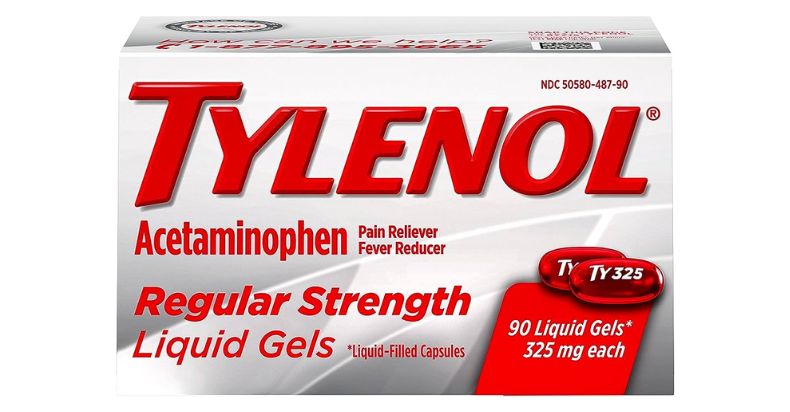The Short answer: Tylenol, typically stays in your system for about 2 to 3 hours for most oral forms, with its pain-relieving effects peaking around 1 to 1.5 hours after ingestion. However, its presence can be detected in urine for up to 3 days after consumption.
Tylenol, known by its generic name as acetaminophen (or paracetamol in some regions), has been a staple in medicine cabinets for decades. Introduced to the market in the 1950s, it quickly gained popularity as an over-the-counter remedy for various ailments, from headaches to fevers.
What sets Tylenol apart from other over-the-counter pain relievers is its versatility. Suitable for both adults and children, it provides relief without many of the side effects associated with other pain medications.
For instance, unlike NSAIDs (Non-Steroidal Anti-Inflammatory Drugs) like ibuprofen, Tylenol doesn’t cause stomach problems or increase the risk of heart issues when taken as directed.
This makes it a preferred choice for many individuals, especially those with certain pre-existing conditions or those who are particularly sensitive to medications.
While Tylenol is widely used, it’s essential for users to understand how it works, its potential side effects, and how long it stays in the system. This knowledge ensures that the medication is used safely and effectively.
Overdosing, for instance, can lead to severe liver damage, so awareness of dosage and frequency is crucial.
In this article, we’ll explore the intricacies of Tylenol, shedding light on its mechanism, ingredients, and safety profile. Whether you’re a long-time user or someone considering it for the first time, this comprehensive guide aims to answer all your questions.
What Is TYLENOL?

Tylenol is not just a brand, it’s a legacy. For many, the name “Tylenol” is synonymous with pain relief. But what exactly is Tylenol?
At its core, Tylenol is made up of acetaminophen, a versatile and effective pain reliever and fever reducer. Unlike other pain relievers like aspirin or ibuprofen, acetaminophen works primarily in the brain.
It reduces the production of certain chemicals (prostaglandins) that cause pain and fever. This makes it particularly effective for conditions like headaches, menstrual cramps, toothaches, and more.
Over the years, the Tylenol brand has expanded its range. Today, it’s not just about the classic Tylenol pain reliever.
The brand offers a spectrum of products tailored for various needs – from Tylenol Arthritis Pain, designed specifically to tackle the persistent pain of arthritis, to Tylenol Cold & Flu, which combines the pain-relieving power of acetaminophen with other ingredients to tackle symptoms like congestion and cough.
Tylenol’s widespread use is not just because of its effectiveness but also its safety profile.
When taken as directed, it’s gentle on the stomach and doesn’t pose the cardiovascular risks associated with some NSAIDs.
However, like all medications, it’s essential to use Tylenol responsibly. Overdose can lead to severe liver damage, so always follow the recommended dosage and be aware of other medications you might be taking that also contain acetaminophen.
How Long Does Tylenol Stay in Your System?
When you swallow that familiar capsule or tablet, it embarks on a complex journey through your body. But how long does it linger, and what does it do while it’s there?
Once ingested, Tylenol is quickly absorbed from the gastrointestinal tract into the bloodstream. Most people start feeling its effects within 30 minutes to an hour. The peak concentration, where it's most effective in relieving pain or reducing fever, usually occurs within 1 to 2 hours after ingestion.
The liver plays a pivotal role in processing acetaminophen. Here, enzymes break down most of the Tylenol into non-toxic compounds, which are then eliminated through the urine.
A small portion, however, is metabolized into a compound that can be harmful in large amounts. This is why exceeding the recommended dose can be dangerous and potentially lead to liver damage.
On average, it takes about 2 to 3 hours for half of the ingested Tylenol to be eliminated from the system of a healthy adult. This time frame, known as the "half-life," can vary based on factors like age, liver function, and whether other medications are being taken concurrently. For most adults, Tylenol is entirely out of the system within 24 hours.
Several factors can influence how long Tylenol stays in your system. These include:
- Age: Infants and elderly individuals might process Tylenol more slowly.
- Liver Function: People with impaired liver function may take longer to metabolize and eliminate the drug.
- Dosage: Larger doses might take longer to be fully processed.
- Concurrent Medications: Some medications can affect how Tylenol is metabolized.
While Tylenol offers effective and relatively quick relief from pain and fever, it doesn’t linger in the body for an extended period. However, it’s crucial to adhere to recommended dosages and be aware of the potential risks associated with overconsumption.
Is TYLENOL Safe?

Tylenol, with its active ingredient acetaminophen, has been a staple in medicine cabinets for decades. Its widespread use is a testament to its efficacy and, when used correctly, its safety. But like all medications, understanding its proper use is crucial.
The Good:
- Gentle on the Stomach: Unlike NSAIDs like aspirin or ibuprofen, Tylenol doesn’t irritate the stomach lining, making it a preferred choice for those with sensitive stomachs or conditions like ulcers.
- No Cardiovascular Risks: Some pain relievers can increase the risk of heart-related issues. Tylenol, when taken as directed, doesn’t have this associated risk.
- Safe for Pregnancy: Many healthcare professionals deem Tylenol safe for use during all stages of pregnancy, making it a go-to for expectant mothers dealing with pain or fever.
The Caveats:
- Liver Concerns: The liver metabolizes acetaminophen. Taking more than the recommended dose can overwhelm the liver, leading to potential damage. This risk is why it’s essential to be aware of other medications you might be taking that also contain acetaminophen.
- Alcohol Interaction: Combining Tylenol with alcohol can increase the risk of liver damage. It’s advisable to avoid alcohol when taking Tylenol or consult with a healthcare professional.
- Chronic Use: While occasional use is generally safe, prolonged, consistent use can lead to potential side effects and should be discussed with a healthcare provider.
Usage Guidelines:
- Read the Label: Always follow the recommended dosage and be aware of the maximum daily limit.
- Be Aware of Other Medications: Acetaminophen is a common ingredient in many over-the-counter and prescription drugs. Ensure you’re not taking multiple medications with acetaminophen.
- Consult with a Healthcare Professional: If you’re unsure about taking Tylenol due to other health conditions or medications, always consult with a professional.
Tylenol, when used responsibly, is a safe and effective medication for pain and fever relief. However, like all drugs, it's essential to use it with knowledge and respect for its potential effects on the body.
How Does TYLENOL Work?
When you pop a Tylenol, you’re probably not pondering the intricate processes happening inside your body. But understanding how Tylenol works can give you a greater appreciation for this common household remedy.
Targeting the Source:
- Brain-Centric Action: Unlike some other pain relievers that act at the site of pain, Tylenol primarily works in the brain. It zeroes in on the central nervous system to deliver its pain-relieving and fever-reducing effects.
- Prostaglandin Production: At the heart of pain and fever is a substance called prostaglandin. Tylenol works by reducing the production of this substance in the brain, which in turn diminishes pain and fever.
Beyond Pain and Fever:
- Mood Modulation: Some studies suggest that acetaminophen, Tylenol’s active ingredient, might have subtle effects on emotional responses. It might reduce not just physical pain but emotional pain as well.
- Broad Spectrum: Tylenol’s mechanism allows it to be effective against various types of pain, from headaches to menstrual cramps to toothaches.
Safety and Efficacy:
- Quick Action: Tylenol starts working quickly, often providing relief within 30 minutes to an hour.
- Short-lived: Its effects are temporary, lasting about 4-6 hours, which is why it’s essential to follow dosing recommendations and not to take it more frequently than advised.
The workings of Tylenol are a testament to the marvels of modern medicine. Its ability to target the brain's pain and fever centers provides millions with relief every day. However, as with all medications, understanding its mechanism and respecting dosage guidelines ensures its benefits are reaped safely.
What is the Definition of a Fever?

Fever is more than just a number on a thermometer. It’s a sign, a symptom, and sometimes even a defense mechanism. Let’s delve into what constitutes a fever and why our bodies resort to this heated response.
The Basics:
- Temperature Threshold: While normal body temperature hovers around 98.6°F (37°C), a fever is typically defined as a temporary increase in body temperature, often due to an illness. A person is generally considered to have a fever when their body temperature rises above 100.4°F (38°C).
- Measurement Matters: The method of measurement can influence the reading. Oral temperatures tend to be lower than rectal or ear measurements.
Why Do We Get Fevers?
- Body’s Defense Mechanism: A fever is the body’s natural way of fighting off invaders like bacteria and viruses. Many of these invaders thrive at our body’s normal temperature, but a fever can hinder their growth and reproduction.
- Immune Response Booster: Elevated body temperatures can also help certain types of immune cells to work better.
Types of Fevers:
- Low-Grade: A mild elevation in temperature, which might not always be a cause for concern.
- High Fever: Temperatures exceeding 103°F (39.4°C) in adults or 102°F (38.9°C) in children. These require prompt medical attention.
- Chronic or Persistent: A fever that lasts longer than two to three days.
Associated Symptoms:
Along with the rise in body temperature, fevers can also bring about:
- Chills or shivering
- Sweating
- Headache
- Muscle aches
- Loss of appetite
- Dehydration
A fever, while uncomfortable, is a clear indicator that our body is doing its job, trying to protect us. However, it's crucial to monitor and understand the underlying cause. Especially in cases of high or prolonged fevers, seeking medical advice is paramount.
Should I Take TYLENOL with or Without Food?
When it comes to taking medication, the question of “with or without food” often arises. With Tylenol, the answer is a bit more straightforward, but understanding the reasons can help ensure you’re getting the most out of your dose.
Digestive Comfort:
- Gentle on the Stomach: Unlike some other pain relievers, Tylenol (acetaminophen) is not an NSAID (non-steroidal anti-inflammatory drug). This means it doesn’t have the same risk of stomach upset or ulcers that some NSAIDs might pose. Therefore, it’s generally safe to take Tylenol on an empty stomach.
- However, a Snack Can Help: If you’ve ever experienced mild stomach discomfort after taking any medication, having a small snack or taking the medicine after a meal can help buffer the stomach and reduce the chance of any unease.
Absorption and Efficacy:
- No Major Impact: Food doesn’t significantly affect the absorption of acetaminophen, the active ingredient in Tylenol. Whether you take it with food or on an empty stomach, it should still provide the same level of pain relief and fever reduction.
- Consistent Results: The primary goal is to ensure you’re taking Tylenol as directed, at the right intervals, to maintain its effectiveness.
Special Considerations:
- Alcohol Intake: It’s crucial to avoid alcohol while taking Tylenol, as both are metabolized by the liver and can increase the risk of liver damage when combined.
- Other Medications: If you’re on multiple medications, it’s essential to space them out and be aware of any that might require food or have dietary restrictions.
While Tylenol can be taken with or without food, the choice often comes down to personal preference and comfort. If you find that taking it with a light snack or meal helps prevent any stomach discomfort, then that's a good practice to follow.
Always remember to read the label and consult with a healthcare professional if you have any concerns or questions.
Final Thoughts:
In our quest to understand the intricacies of Tylenol, we’ve delved deep into its composition, workings, and the considerations surrounding its consumption.
Understanding how long Tylenol stays in your system, its safety profile, and the myriad of ingredients that make it effective gives us a clearer picture of its role in our medicine cabinets.
Moreover, by addressing common queries like its compatibility with food, we aim to make your Tylenol experience as informed and beneficial as possible.
In the realm of over-the-counter medications, knowledge truly is power. By being informed, we can ensure that we’re using Tylenol to its fullest potential, safely and effectively.
Whether you’re combatting a fever, nursing a headache, or seeking relief from muscle pain, remember the insights shared here and always consult with a healthcare professional for any concerns.
Stay informed, stay safe, and here’s to your health and well-being!
